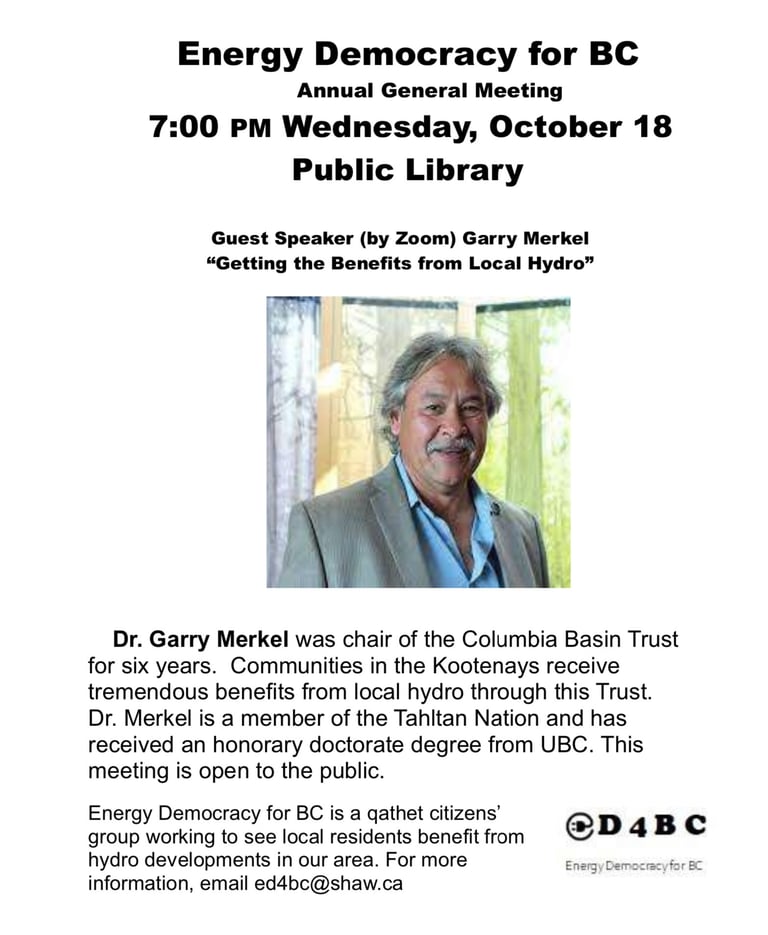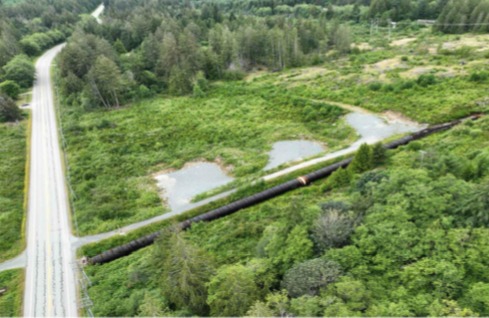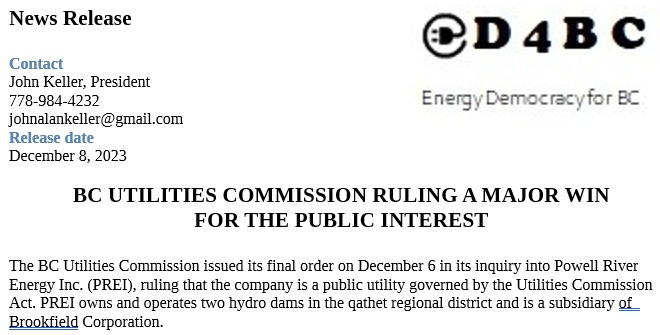Energy Democracy for BC
About Us
Energy Democracy for BC was founded as a non-profit society in 2021 when the Powell River mill closed and Powell River Energy began exporting 100% of the power from its dams to the US. We took our inspiration from the Columbia Basin Trust, an organization set up to ensure that the people living in the Columbia Basin benefited from the dams in their region.
Our main activities have been:
Organizing public presentations, including:
o Corky Evans, a founder of the Columbia Basin Trust who spoke on “Capturing Community Benefits From Natural Resources”.
o Gary Merkel, a former director of the Columbia Basin Trust, presented on how the Trust was established as a collaborative effort of residents impacted by dams, local governments, First Nations, and local MLA’s
o Deborah Curran, director of the University of Victoria’s Environmental Law Centre, presented on the legal aspects of water licenses
Making submissions to government inquiries and hearings, City Council, the Tla’amin Nation Executive Council, and the qathet Regional District.
o Submission to the BC Utilities Commission responding to Powell River Energy Inc.’s application for an exemption from aspects of BC Utilities Commission oversight
o Submission to the Canada Energy Regulator responding to Powell River Energy Inc.’s request to for a blanket 10-year permit to export all energy it produced to the US
o Submission to the BC Utilities Commission responding to Powell River Energy Inc.’s request for a total exclusion from BC Utilities Commission oversight. See a detailed description of this work below.
o Letters to the federal Department of Transport advocating for enforcement of the Canadian Navigable Waters Act.
Writing articles on, collecting research reports about, and taking photos of dam impacts. We encourage people using the watersheds to send us their own photos if they see damage to fish habitat or low water levels harming recreation.
ED4BC’s interventions in BC Utilities Commission hearings on Powell River Energy Inc
Background
Powell River Energy Inc (PREI) has operated as a regulated public utility since 2001 under the provincial Utilities Commission Act. The company received a partial exemption allowing power exports not used by the local mill, first granted in 2001 and extended in 2017.
When PREI's power purchase agreement with the mill ended in 2021, the government repealed its exemption. PREI applied to the BC Utilities Commission (BCUC) in 2022 for an extension but withdrew the application. The Tla'amin Nation, local residents, and ED4BC had opposed PREI’s application.
In December 2022, PREI requested complete exclusion from the Utilities Commission Act, arguing it should not be regulated by BCUC at all. This prompted a BCUC inquiry that received 35 comment letters from qathet area residents opposing the exclusion, plus submissions from the City of Powell River and qathet Regional District.
Mayor Ron Woznow strongly opposed the exclusion, stating: "The power-generating operation of PREI exploits and relies upon land and water which are local natural resources, and which should be managed and preserved for the benefit of its local residents... A system of regulation which would leave all decision-making power in the hands of a foreign-controlled entity to allocate power for the exclusive use of foreign customers would be contrary to the public interest." (https://powellriver.civicweb.net/FileStorage/1D34ADBBC7A14E13B61F850803CBCDBE-Letter%20to%20BCUC%20re%20PREI.doc, June 22, 2023)
ED4BC's Intervention
ED4BC received intervener status, one of only two groups granted this designation. We intervened because the Utilities Commission Act covers PREI as a public utility. The Act broadly defines public utilities as entities that generate and sell energy, with exclusions only for producers using energy for their own operations. While the mill previously qualified for this exclusion when it owned the dams, PREI does not.
We considered this hearing critical for two reasons:
Dam Safety Oversight: As qathet area residents, we want BCUC to maintain authority over PREI's dam safety. The provincial Auditor General found serious deficiencies in 2021 regarding the Ministry of Forests, Lands and Natural Resources' enforcement of dam safety regulations. BCUC can address enforcement gaps, which is vital for community safety—especially since PREI's infrastructure impacts Highway 101, the main evacuation route for the area.
Public Interest Protection: We're concerned that a power producer once central to our town's economy now operates disconnected from it, exporting all locally produced power to the US and being a subsidiary of a company registered in Bermuda. BCUC regulation ensures some community influence over safety standards and power supply contracts that affect the public interest.
Jim Quail of Allevato, Quail and Associates represented ED4BC, arguing the legal case for why PREI should remain under the Utilities Commission Act.
Outcome and Current Status
In December 2023, the BCUC panel rejected PREI's arguments for exclusion and ruled that PREI fits the definition of a regulated public utility. PREI requested reconsideration, but the panel upheld its decision in March 2024.
PREI then appealed to the BC Court of Appeal, receiving a stay on BCUC's orders. The Court granted leave to appeal in September 2024. As of May 2025, no ruling had been issued.


Gary Merkel was ED4BC's guest speaker at our 2023 AGM.


"Dam risk" is the province's rating for the consequences if a particular dam were to fail. The dam risks are catgorized as "very high" for both the Powell and Lois dams. The penstocks from the Lois dam go under Highway 101, the main evacuation route for qathet residents.


ed4bc@shaw.ca
© 2025. All rights reserved.
